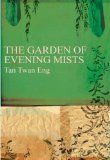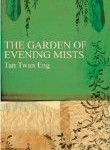 Shortlisted for 2012 Booker Prize
Shortlisted for 2012 Booker Prize
Five words from the blurb: Malaya, Japanese, war, gardener, tattoo
The Garden of Evening Mists is set in a remote region of Northern Malaya. It is here that Yun Ling Teoh, the sole survivor of a Japanese concentration camp, discovers a Japanese garden. She meets the skilled craftsman who created it, but because the tranquility of the garden is in stark contrast to the horrific way she was treated by the Japanese during the war her relationship with him is difficult and emotional. As the book progresses the story becomes more complex; involving escalating violence within the country, mysterious tattoos and Yun Ling’s terrible experiences in the concentration camp.
I’m not a fan of gardening so this book didn’t appeal to me initially, but the more I read, the more I fell under its spell. By the end I was transfixed and impressed by the depth and complexity of the narrative. I was also surprised by the way the author made me interested in both the construction of Japanese gardens and horimono tattoos – it takes a skilled author to bring such diverse topics to life.
The descriptive passages in the book were wonderful – they described the Malayan jungle and the Japanese garden beautifully. Unfortunately the dialogue didn’t seem to be of the same high standard – I found it clunky and irritating. The following passage is a good example of the way dialogue ruined a good descriptive passage:
The lights in the garden came on, dizzying the flying insects. A frog croaked. A few other frogs took up the call and then more still until the air and earth vibrated with a thousand gargles.
‘Ah Cheong’s gone home,’ said Frederik. ‘He’ll come tomorrow morning. I brought you some groceries. I imagine you haven’t had time to go to the shops yet.’
‘That’s very thoughtful of you.’
‘There’s something I need to discuss with you. Perhaps tomorrow morning, if you’re up to it?’
‘I’m an early riser’
‘I hadn’t forgotten.’ His eyes hovered over my face. ‘ You’re going to be alright on your own?’
‘I’ll be fine. I’ll see you tomorrow.’
He looked unconvinced, but nodded. Then he turned and walked away, taking the path I had just come along, and disappeared into the shadows beneath the trees.
As I made my way further into the book the dialogue became less of a problem. I can’t decide whether this is because I got used to it and so it began to feel natural, or because the plot became more gripping and so I could overlook any problems I had.
I wasn’t very familiar with the history of Malaya before starting this book, but the historical events were seamlessly blended into the plot and I didn’t find my lack of previous knowledge to be a hindrance. It was wonderful to read such a culturally rich book and I loved learning little snippets of information about both Malaya and Japan.
The Garden of Evening Mists is a fantastic novel. It is beautifully structured, packed with complex characters, and contains a haunting narrative that introduces the reader to a period of history that is often overlooked. I hope it wins the Booker Prize next week.
 (I nearly gave it 4.5 stars and can see that my appreciation of it may grow with time)
(I nearly gave it 4.5 stars and can see that my appreciation of it may grow with time)
.
The thoughts of other bloggers:
The over-arching sense of place spans the whole book beautifully – there were times I felt I could close my eyes and see the whole estate laid out before me. Alex in Leeds
The Japanese-style garden of the title, located in a mountainous region of Malaysia, displays characteristics of organization, order, and beauty that the author mirrors in his construction of the text: absences, internal borrowings, sudden revelations through carefully revealed scenes, and many other attributes of artful design. Read, Ramble
Although this book is reminiscent of Kazuo Ishiguro’s The Remains of the Day I thought Tan brought something extra to the piece. He brought more culture, more plotting. JoV’s Book Pyramid

26 replies on “The Garden of Evening Mists by Tan Twan Eng”
I read this one earlier in the year and LOVED it. It was beautifully written and Tan’s treatment of history was one of subtlety and sympathy, especially as it’s about a complex and emotional period in Malaysia’s history.
Sakura, I can see why you loved it. If I loved gardening I think I’d have appreciated it more, but even without that I can see what an amazing achievement this book is. I agree the subtlety and the way it had sympathy for both sides of the war were impressive.
I’m no fan of gardening either, so I may not have picked this up on my own. But the book sounds great otherwise. I haven’t read any books set in Malaysia, so this is probably a good start.
Athira, The heavy gardening references in the blurb put me off too. I wouldn’t have read it without the Booker Prize, but am pleased I did. There are a few slow bits, (especially in 1st half) but it is all worth it in the end.
I really loved this book and it would be great if it won the booker. The language is poetic. Much to my surprise as a non gardener, I even loved the descriptions of gardening. for my review go to http://vikzreadsthebooker.wordpress.com/2012/08/10/booker-read-one/
Vikz, As a non gardener I even liked some of the gardening bits too! Not all of it though – there was only so much I could take 😉
I’m not a gardening fan but interestingly enough, I found the wartime focus captured me more than any possible boredom over the gardening bits. I was really captivated by this novel — it felt very quiet and meditative without being super, I don’t know, brainy? Does that make sense?
Audra, I agree that the war time bits were captivating and I also agree that it was clever without feeling pretentious – such a rare skill for a writer to achieve.
I’ve just posted my review of this, Jackie, and I agree with everything you say …. apart from the clunky dialogue, which I thought accurately reflected the politeness between the characters. And in the instance you quote, the awkwardness of Frederick’s understated but unreciprocate love for Yun Ling.
Lizzy, I can see that the dialogue could well be an accurate reflection of their speech, but it still annoyed me and every time anyone spoke I longed for the descriptive passages to return. I’ll head over to your blog now and see what you had to say….
This is on my wish list. I am interested in this period of history and the story sounds suspenseful.
Harvee, It isn’t a fast paced novel, but it is so atmospheric. I hope you enjoy it as much as I did.
This sounds lovely, just requested it from my library 🙂 Thanks!!!
Jennifer, Yay! Enjoy!
No I pretty much suck at gardening…everything I touch dies. But I appreciate them! In my husband’s home town of Wroclaw, they have the most amazing Japanese garden, and we go there every time we visit. I would have no issue imagining the garden in this novel because of that. The dialogue is pretty flat, but if you got over it, anyone would.
Sandy, I do love gardens, but haven’t the patience (or interest) to create my own. I’m quite happy to visit someone elses and live in my overgrown jungle!
I’m glad you like it Jackie and thanks so much for the mention. 🙂
I admit the dialogue was clunky but like you said somehow along the way I seems to get used to it. I blame it on the way Malaysians learn English, use as first language most of the time but we learn English as second language.
But I don’t know what is it about the book that makes it so haunting. Suppose the scenes that were painted is so out of the world, so surreal that overall it made me wants to live out in the hills, like the characters.
Jo, I’m so pleased I ended up liking it. At the half way point I had such mixed feelings, but it all came together at the end.
I think it was haunting because it was so subtle. It didn’t try to shock the reader, but left us to fill in many of the most disturbing scenes ourselves. I find that has more impact than the graphic descriptions you get in some books. Let’s hope it wins next week.
I read Alex in Leeds’ review of this recently and it sounds a delight – I can’t imagine it winning on Tuesday though…I spent some time in this area when I was a student, so I’m sure I would enjoy it. Just don’t seem to have the time for all these books Jackie…urghh!
Sarah, I really hope that you’re wrong about Tuesday – if you read it then I think you may well change your mind about that 😉 I hope that you find the time to read this one – it is well worth it.
Just finished watching BBC Review Show and am now more hopeful for this book – it might be a case of quality over publicity which is right of course..
Sarah, Yes. I watched the BBC Review Show too. I saw them all raving about The Garden of Evening Mists and was really pleased. I was then sad to see that they all chose a different winner, but hope in the end they’ll have to compromise and come back to it.
This book is on my ‘to read’ list. I really enjoyed his previous novel – ‘The Gift of Rain’ – and thought this sounded just as impressive.
This was on my to-read list, but not particularly high on the list. However, having read your review and a few others, I’m not more interested. I’ll certainly get to it sooner than I otherwise might have. Thanks!
loved it as well ,although not a garden like gardening bit maybe inspire me when we get house with a bigger garden ,all the best stu
[…] which has improved the most since reading: The Garden of Evening Mists by Tan Twan Eng I wasn’t that impressed with this book when I was reading it, but on completion everything […]